Peter MALONE
Saturday, 18 September 2021 20:00
Spear
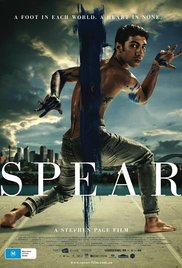
SPEAR
Australia, 2015, 83 minutes, Colour.
Hunter Page- Lochard, Aaron Pedersen.
Directed by Stephen Page.
One might call Spear a cinema event. It was screened at a number of festivals and then received some limited cinema release.
The reason for seeing this cinema event is that it presents the Bangarra Dance Company, celebrated in Australia for over 25 years, an indigenous company, performing promoting aboriginal art, dance, and exploration of ideas. Is also draws strongly on aboriginal history, before the white arrivals and settlement as well as the uneasy coexistence and hostility between black and white.
Stephen Page is the director of the company and the director of the film. His son, Hunter Page- Lochard, is the principal dancer. The full complement of dancers includes black dancers as well as white. There are also some acting roles, principally that of the Suicide Man, played by veteran actor Aaron Pedersen (Mystery Road, the Jack Irish series).
The film has striking visuals, cinema being able to provide an enormous range, and, with the editing, intercutting them with great effect. There are scenes from the city, dark alleyways, a tenpin bowling rink, escalators… Some of the film was made in Sydney, in studios on Cockatoo Island, but there is a great deal of location photography, especially in Arnhem Land, with its waterways, with its desert, foliage, and a pervading red.
The narrative the film concerns Djali, a young man on a journey, a quest for his identity in himself and as an aboriginal man. At the opening, there is a complex ritual, a kind of awakening for the young man, and the consecration. Ochre and paint are frequently placed on him and on other characters, indication of the tradition of the corroboree. As he goes on his journey, he walks through the city, and encounters the Suicide Man and his alcoholic haze, his wry comments, his anger at people passing by. Later, there will be an Old Man, a kind of guide, who eventually hangs himself. Others are described as Alcoholic Man, Androgynous Man, Abused Man, Big Man, Prison Man.
While the film has an immediate impact for an indigenous audience, there are various moments when a white audience will be challenged, invited to reflect, invited to appreciate – and a comically ironic episode featuring the very popular (if now seen as fairly racist) song, My Boomerang Won’t Come Back!
Djali moves through the city and then out into the deserts, encountering a range of characters including an Old Lady, Earth Spirit, Woman of Desire, sometimes presented like icons against the desert background, as are some of the tribal men, covered in white, and standing in the desert.
Accompanying the young man on his journey are a number of dancers, enabling the audience to appreciate the virtuosity and talent of the dance group. While there are some female presences, Spear is predominantly a film about males. At various times there are also white dancers and white actors involved in interactions, both in harmony and in disharmony, struggle and fight.
The event builds to a climax, the achievement of the young man, his coming into his own – although, as one of the few lines of dialogue mentions, he has a foot in each world but his heart is in none.
Published in Movie Reviews
Published in
Movie Reviews
Tagged under
Saturday, 18 September 2021 20:00
Rock the Kasbah
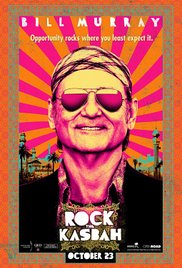
ROCK THE KASBAH
US, 2015, 106 minutes, Colour.
Bill Murray, Bruce Willis, Kate Hudson, Zooey Deschanel, Leem Lubany, Arian Moayed, Scott Caan, Danny McBride?.
Directed by Barry Levinson.
Rock the Kasbah should not be confused with the Israeli military film, Rock the Casbah, or the Moroccan film of the same name about a large family and their relationships. This one is set in Afghanistan.
Since the 1960s there have been satiric films about war and the waging of war, from Dr Strangelove in 1963 to M*A*S*h and Catch-22 in the early 1970s. M*A*S*H introduced the idea of comedy and satire even in contemporary war. While there have been very serious films about American involvement in Iraq and Afghanistan, It is only now that we have the satiric comedies coming in, this film as well as Whiskey Tango Foxtrot with Tina Fey and Margot Robbie.
This is a star vehicle for Bill Murray, capitalising on his laid-back, touch of the lazy, wisecracking conman style. In the United States, Murray is a record executive, Richie, holding auditions with his secretary, Zoe Deschanel who has singing hopes of her own, but mainly interested in affirming the singers and getting them to pay their fees. When a military recruiter visits a club, he is impressed by the singing and suggests to Richie that he goes on one of those entertaining the troops tour – in Afghanistan.
It is an opportunity that Murray has been looking for, but his secretary gets cold feet and, after landing in Afghanistan and experiencing the military atmosphere as well as the possibility of terror attacks, she opts out with the help of a local military character played by Bruce Willis, Bombay Brian.
Richie also gets tangled with Merci, a local prostitute (Kate Hudson) who decides that there are possibilities in a record executive working with local talent. Audiences might be surprised to see one of the Afghan television shows, Afghan Star (a local version of American Idol), with all the glitz and enthusiasm compere and judges, of Western TV talent shows. This becomes all the more important when Richie is caught up country and hears a young woman singing, is entranced by her voice and decides that she is the one. Needless to say, her father and other members of the clan in the village are not support of this at all – although they are not above having a look at the TV show later on.
The singer, Salima (the Leem Lubany) hides in the boot of the car, persists in pressurising Richie that she go on the show and, between the jigs and the reels, many of them, she eventually does, breaking through a lot of the taboos about women, singing, public performance.
As might be expected, the film is very (very) American in tone which might be very popular at home but has its moments of grating on audiences beyond the United States.
1. US, 21st century? Post 9/11? Military operations in Afghanistan, Iraq?
2. The rock world, singers, agents, gigs, audiences?
3. The musical score, the range of songs, in the gigs?
4. The Muslim background in Afghanistan, sharia law, the Afghan war, the warlords, codes, the role of women? Singing in public and the TV program?
5. The American background, Ricky as a Bill Murray character, as an agent, his image of himself, his age, memories, false memories, his agency, working with Ronnie, the initial singer, his praise for her, offering the contract, the handshake, getting her fee?
6. Ronnie, the work for Ricky, composing songs, wanting to sing, her gig in the club, people walking out? The military agent, his enthusiasm, the possibility for tours, Ricky and his agreement, Ronnie and her apprehensions? The plane, fear, arrival, the military, bombs? The hotels, rooms? Ronnie petrified, Bombay Brian and the military background, offering him cash, leaving, Ricky stranded?
7. The contact with his wife, the discussions with his daughter, her warnings? is being stranded and asking for money?
8. The American scroungers, in the clubs, the women, Merci, her typed? The night, the plan, her character, becoming a partner, enthusiastic, despairing with Ricky as a loser, giving up? Urging Ricky to go back to work?
9. The taxi driver, talk, as interpreter, the military connections, going into the villages, the encounter with the warlords?
10. Ricky hearing Salima missing, her being hidden, the desire to sing, gift, Ricky and his trying to persuade her, persuade the father, the guns, the violent reaction of the father, leaving, her hiding in the boot of the car, wanting to walk to Kabul, Ricky taking her?
11. The credits, the TV show, the Afghan Star? The host, discussions with Ricky, listening to Ricky’s lying? The contestants and their reactions? The audience, the judges, the glitz? The range of audiences? The singing, everybody watching on television, the votes? The father’s anger, taking Salima home?
12. Ricky, wanting to give up, Merci, challenging him? The votes and Salima winning?
13. Ricky and his success? Despite himself?
14. The precedent for this kind of film in the Vietnam War, dramas about rock? The role of the Americans, intervening – and the scenes where they were told off? American supremacy, arrogance, telling everyone what to do?
15. For worldwide audiences, the dramatising of situations in Afghanistan?
Published in Movie Reviews
Published in
Movie Reviews
Tagged under
Saturday, 18 September 2021 20:00
Our Brand is Crisis
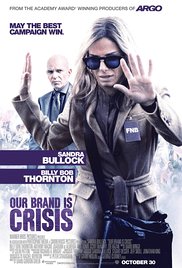
OUR BRAND IS CRISIS
2015, 107 minutes, Colour.
Sandra Bullock, Billy Bob Thornton, Anthony Mackie, Joaquim de Almeida, Ann Dowd, Scoot McNairy?, Zoe Kazan, Reynaldo Pacheco.
Directed by David Gordon Green.
2015 and 2016 have seen extraordinary campaigning for both Democrat and Republican nominations for the presidency. Candidates go on the campaign trail more than a year before the actual election date. There are huge staffs, advisers, spin doctors, experts studying language, body language, noting every incident and nuance which might alienate voters. The spectacle of the campaigner Donald Trump, his wealth, self-confidence, bullying comments, prejudices against Hispanics, Muslims…
Which means the satiric here, might not be as exaggerated as it might at first seem.
The main characters are American but the campaign is for the presidency of the Latin American country of Bolivia. There is a popular candidate, some other candidates whose campaigns are not emphasised in the film, and the former President who wants to make a comeback. The decision has been made that American experts should be flown in and get to work on the political make-over to make sure that the candidate will be elected. On the face of it, this is a huge task. He has a reputation for conservatism and is personally arrogant (Joaquin de Almeida).
The director is David Gordon Green, who began with small budget serious and comic films like Undertow, All the Real Girls, had a phase where he made some outlandish comedies like The Sitter and Your Highness as well is the very funny Pineapple Express, and then moved to films like this, more serious comedies with point, Prince Avalanche, and as writer of Goat.
Two members of the task campaign, Nell (Ann Dowd) and Ben (Anthony Mackie) committee decide to approach a successful veteran from past American elections, Jane (Sandra Bullock). She has retired from the public eye and seems particularly reluctant to become engaged again. But the overtures from the committee members prove tantalising and off she goes to Bolivia. The other member of the team, Buckley (Scoot McNairy) is very sceptical about her.
In Bolivia, she finds a friend/enemy campaigner from the past, Pat Candy (Billy Bob Thornton), and part of her energy is aroused by the prospect and the practicality of some dirty tricks interactions, he very smart with a touch of smugness, she very smart, even smarter.
Audiences will find the film interesting as the American team study the presidential candidate, assess his strengths and weaknesses, especially his weaknesses, and devise strategies, image-changing, meeting people, concealing his arrogance to make him more viable than he is – and, of course, finding situations, money deals, that will undermine the credibility of the popular candidate.
As the team goes off into the Bolivian countryside, they meet quite a ground swell of opposition, especially from indigenous people – and, it is intriguing, if somewhat disgusting, to see the smarmy speeches and calculated gestures to win them over. In the countryside, each group is travelling in a bus along the steep mountain roads – and the rivalry is dramatically (and rather stupidly) dramatised and symbolised in a race to overtake the other no matter the danger.
There is co-operation from some of the locals, especially a young lad who believes in the candidate and is commissioned to be eyes and ears – that is, spying – to pick up information about the opposing camps. Jane also calls in an expert in digging up dirt and information.
The film does show the election day and its aftermath, the success of the candidate and his calculated behaviour as soon as he is elected, endorsement as well as disillusionment, especially on the part of the young man who volunteered to help – and Jane herself walking amongst the crowds, amidst new protesters, doing a bit of reflection on what she had contributed to. Which gives the audience an opportunity to draw some conclusions about campaigning, its artificiality and falsehood, possibilities for genuine communication with people, and politicising, compromise – and downright lies.
1. The title, expectations? A piece of Americana, the American electoral system, campaigns, using of means for ends? The American experience transferred to Latin American countries? Advice, the emphasis on crisis in order to win?
2. The spoof touches, satirising the Americans, types, dirty tricks, wanting to win at all costs, the nature of the advice? Adapting to Latin America, Bolivia, intervening?
3. In the US, Nell and Ben, approaching Jane, her initial reactions, retirement, gradually becoming interested? The advice team? With Buckley? The American presuppositions?
4. Bolivia, the Latin American situation at the beginning of the 21st century? Candidates, the populist candidate, the former president and wanting his return, other anonymous candidates? The range of the population? The city and sophisticated life? Ordinary people? Indigenous people and the issues? Global finance, the IMF, issues of trade, the banks, money reserves? The details of the campaign, the role of the media, the advisers, the tricks?
5. Ben and Nell, the personalities, the relationship with Jane, the visit, her listening, the energy aspects? Her agreement to go with them?
6. The team, as is a group, winning at all cost, learning? Buckley and his superior tone? The tensions between the team, watching the candidate, watching television? Jane and the initial detachment, meeting to Castillo, her playing on words to him?
7. Castillo, his past, personality, arrogance, not going well in the media, his policies, his assistants? The media, creating the commercials, his catching people – and the commercial being rejected? Rehearsing him, his clothes, attitudes, the tour, his meeting people, the protesters and his being pleasant to them, referring to “these people”, the progress of the campaign, the effect on him personally, improvement in the ratings?
8. Pat Candy, his past, smooth talk, relationship with Jane, the edge? The discussions, the tricks, the information? Jane and her fabrication of the card? His retaliation? Jane and her trick about the quote, in fact Goebbels, the media response to this?
9. Castillo’s rival, man of the people, the meetings, the target of dirty tricks, the disappearance of the money for cars…? His losing?
10. Nell, Ben, their experience of the campaign?
11. Jane calling in Le Blanc, speaking English and Spanish, her skills in digging up all kinds of information about people, her contribution to the campaign?
12. The buses, the rivalry, the dangerous driving and overtaking?
13. The end of the campaign, the voting night, winning?
14. The young man, the photo with Castillo, his loyalty, Jane and the visit to his family, the arguments with his brothers and friends? His spying for the camp, taking photos?
15. Castillo, the immediate change of policy?
16. The boy and his disillusionment, joining the protest, Jane not going to the airport, walking in the march?
17. The message about American campaigns, the end justifying the means, dirty tricks – and possible disillusionment?
Published in Movie Reviews
Published in
Movie Reviews
Tagged under
Saturday, 18 September 2021 20:00
Miracles from Heaven
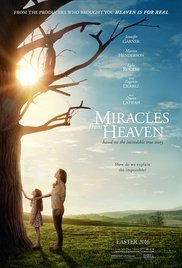
MIRACLES FROM HEAVEN
US, 2016, 109 minutes, Colour.
Jennifer Garner, Kylie Rogers, Martin Henderson, Queen Latifah, Eugenio Derbez, John Carroll Lynch.
Directed by Patricia Riggen.
It is said that after the success, commercially, of The Passion of the Christ, American faith films received a boost of confidence, moving to bigger budgets, campaigns for wider and mainstream distribution, both in the United States and beyond. Miracles from Heaven is one of these films.
These faith films divide opinion and comment. American secular reviews of Miracles from Heaven are quite damning, not ready to give much credit to such films, saying that they are too pious, too sentimental, too unreal, especially in this case as in the previous Heaven is for Real, the events, the healings and miracles, too difficult to swallow.
On the other hand, for instance on the Internet Movie Database, practically all of the comments are from the faith audience who have found this film not only a good entertainment but a reinforcement of faith and values.
It is based on a true story and a book by the mother of the family, Christy Beam. She and her husband, Kevin, and their three daughters are a typical middle American family, he a vet who works some of the land, she a mother, and the family are members of the local evangelical church, led by very genial pastor, John Carroll Lynch. Clearly, this is a wholesome story in its perspective and treatment.
When the middle daughter experiences stomach and throat trouble, is in continual pain, and the diagnoses assert that there is nothing basically wrong with her, Christy becomes very angry with the doctors and demands further tests, which leads to the discovery that the girl has severe intestinal problem, especially for any digestion of food. While the family prays, and the Christian community is supportive, there is a severe scene where two of the ladies of the parish accost Christy and say that either she and the family, or even the daughter, must have sinned in some way for the daughter to be so ill. Christy loses her sense of faith.
In a sense, this is a story about family, how they deal with in illness, the contact with a world specialist in Boston with an enormous waiting list and Christy, determined, takes her daughter to Boston and, providentially, gets an appointment. The doctor is in the vein of such medical characters as Patch Adams, a way with children, a way with adults, cheerful and joking even when the prognosis indicates terminal illness.
There is a miracle in this film, not as one might have anticipated, but a healing.
One of the interesting aspects of presenting miracles on screen is the response of different faith communities towards miracles. For more evangelical communities, this is an encounter with God, and intervention in people’s lives. Catholics need to remember that miracles are required for any progress on stages for beatification and canonisation and that at any one time around the world many Catholics are praying for here things for potentials saints and their recognition.
Some physical comments made during the film and the issue of spontaneous reconstruction. On the other hand, with the little girl saying that she had an encounter with God, this could be seen as the equivalent of a dream – and there is a great deal of thinking and writing on the effect of dreams on the human psyche and the human body.
Yes, the film was very American, is not ashamed of sentiment, is not ashamed of prayer and faith. The central couple is played by Jennifer Garner and Martin Henderson. And the very sympathetic doctor is played by Eugenio Derbez. Kylie Rogers gives a persuasive performance as the sick girl, trying to cope with her continued pain and hospitalisation, tests and treatment, bonding with her family, healed.
And, in the final credits, there are photos and video footage of all the family several years after the miraculous experience – the young daughter herself, large as life, on the screen as a testimony to her faith.
1. A faith film? Responses to faith films? The American response, too explicit faith testimony and stories? Witness?
2. The role of sentiment in these films, manipulation, American style – or not? The response to American sensibilities and feelings, stories and issues?
3. Audience welcome to faith films? Non-religious comment, putdowns, intolerance, lack of respect?
4. The true story, the link with other such stories as Heaven is for Real? A faith community? Illness, hospital, the role of doctors, cures or not, palliative care, prospect of death, possibilities for recovery?
5. Miracle as defined in the film, the achieving of the seemingly impossible? Physically? The faith context for healing, its possibility or not? Catholic audiences and expectations about miracles, their possibility, requirements for canonisation? Evangelical churches, the experience of God, and encounter and its consequences? The issue of spontaneous reconstruction?
6. The family, a pleasant family, Christa as a concerned mother, the three daughters and their ages, interactions, churchgoing mother? Kevin, the vet, work in the fields, relating well to his daughters? Ordinary people, ordinary lives? American style?
7. The pastor, the welcome to the church, the crowd, genial, his humorous talk, uplifting, the enthusiasm for the singing, and lively faith community?
8. The girls, their age, interactions, the little girl, aged 6 and treatment of her? The older daughter and responsibility? Anna and her illness?
9. The sickness, the meals, Anna vomiting, in pain, the rawness in her throat, crying out in the night? Going to the hospital, the various diagnoses, the fever, automatic reflux, the continued diagnoses and medications but no effect? The little girl being despondent, almost opting out of life?
10. Taking Anna to the hospital, Christa and her being angry, the reaction of the doctor, the further tests, the expert and the diagnoses, the doctor’s apology? The new test and intestinal difficulties, the explanation? No prospect of a cure? Relief?
11. Information about the doctor in Boston, the phone calls, no replies, the long waiting list, his patients and their deaths? Christa making the decision to go, accosting the receptionist, her plea? The effect on the receptionist? Going to the cafe, meeting the friendly waitress, her offer of the tour of Boston, going to the aquarium (and Anna not being able to go at home, the discussions with the boy who was her friend)? The appointment, time becoming available? The doctor, personable, funny, his ties etc, way of talking, his ability for handling children and putting them at ease? And with parents? The further tests, the different diagnoses, the trials, the prospects, the fact that Anna would die? The recommendation of the frequent visits and tests in Boston?
12. The issue of money, Kevin as a vet, setting up his business, taking up the loans, doubling his work? His love for his daughter, finding ways to pay for the trips in the hospital care?
13. Going to the church, prayer, Kevin as a man of faith, the two women and their accosting Christa, suggesting that there must be some sin involved, on hers of the family’s part, or even on Anna’s part? Christa’s angry reaction? Losing her faith? Going to visit the pastor, talking about her experience? Kevin trying to encourage her in faith and her desperate reactions?
14. Accepting the reality, Anna and her attitude, continually in pain, the family wanting to go to Boston, the man at the counter allowing them to get the ticket despite the credit card over charge? Surprising Anna and her joy, morale-boosting? The importance of the little girl in the next bed, her cancer, Anna giving her the necklace? The reaction of her father, not a faith person, asking Christa not to encourage false hopes in his daughter?
15. Back at home, Anna and her reserve, persuaded to go up the tree, climbing, falling, the long time for the rescue, the television, the firemen, the medical prognosis?
16. Taken to hospital, waking up, feeling better, physical, mental, her explanation of her meeting God and the experience? The change, going back to ordinary life? A way of looking at this kind of miracle, the reality of dreams, the effect of dreams, and Anna’s experience of
God as a dream equivalent?
17. The scene in the church, Christa giving her witness? The pastor and his encouragement? The response of the congregation? The women and the critique that she was seeking publicity? The television presence? The father of the little girl with cancer, his coming, his giving witness, Christa’s testimony?
18. The final credits and the video and photographs of the actual characters – and Anna still alive and healthy?
Published in Movie Reviews
Published in
Movie Reviews
Tagged under
Saturday, 18 September 2021 20:00
Labyrinth of Lies/ Im Labyrinth des Schweigens
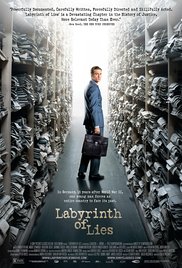
LABYRINTH OF LIES/ IM LABYRINTH DES SCHWEIGENS
Germany, 2015, 124 minutes, Colour.
Alexander Fehling, Andre Szymanski, Friederike Becht, Johannes Krisch, Kurt Voss, Tim Williams.
Directed by Giulio Ricciarelli.
In going in to see Labyrinth of Lies, it did not occur to me that a film set in Frankfurt, Germany, in the late 1950s, could serve as a mirror of film for Australia, other organisations and nations - and the Catholic Church - in 2016.
Yet, it does.
The subject of the film is how German society, prospering in the 1950s under Chancellor Adenauer, could put behind it the experience of World War II, the experience of Hitler and the third Reich (which lasted comparatively few years instead of the predicted and hoped-for thousand).
The screenplay of the film suggests that many ordinary Germans, the German middle-class, had very little knowledge of Auschwitz and the concentration camps and of the horrors that were enacted there. The name of Auschwitz seemed quite unfamiliar to so many. A number of the authorities chose not to acknowledge Auschwitz let alone admit to the presence of the prisoners, their treatment, and the mass extermination.
The film features a young lawyer, ambitious, who by chance encounters a journalist challenging the legal authorities by bringing a survivor of Auschwitz to their offices. The chief inspector in Frankfurt throws the page of information into the rubbish bin – with the young man later quietly going to retrieve it, contacting the journalist, being brought into contact with the survivor, going through his locked case and unearthing some incriminating documents. The survivor himself is initially unwilling to collaborate, remembering the fate of his daughters and his inability to help them when they were separated from him and put into the charge of Dr Mengele and subjected to his barbaric experiments. The sequence where he explains his sadness and the tragedy of his girls and of his life, his compassion for his daughter-victims and his feeling towards the man who cruelly abused them, is one of the most moving moments of the film.
The lawyer gets the support of the Attorney General, himself a Jew who had been incarcerated in a concentration camp in 1933. He is encouraged to approach American authorities, the occupying force archives, to retrieve Auschwitz documents which, eventually he does, a truckload of them. He and his associate with the woman who served as a secretary in his office, spend a great deal of time and energy combing through the documents while he accosts some of those mentioned with the intention of arrest.
The powers that be put obstacles in his way at times and in no way is he supported.
The lawyer has a great admiration for his father, a lawyer who had handed onto his son the ideal of the search for truth. When he realises that his father, as all lawyers were expected to be during Hitler’s time, was a signed-up member of the party, he becomes disillusioned, especially as all his attempts to track down Dr Mengele during his secret visits to Germany from Argentina, are thwarted. There is also the complication that the German government is in contact with Mossad who are intent on bringing Eichmann and Mengele to justice but, at the time, prize the return of Eichmann to Israel for trial as more significant.
At the end of the film, with documents, including Commandant signatures on orders for gas and equipment for the camp, German methodical bookkeeping leading to incriminating papers, the audience is told that many of those responsible in Auschwitz were tried in the courts, most found guilty.
The film serves as a gripping investigation, uncovering of secrets, a mission for justice.
And the connection for Australia and the church? In watching the film, one could have substituted a number of times church for Germans, for failure of memory, unwillingness to remember, cover-up and allowing perpetrators to live free lives, untouched by their victims or the victims’ families. In terms of the church and sexual abuse, the parallel is very telling – and discomforting. The German title, has been translated for English-language distribution as Labyrinth of Lies but the German, Im Labyrinth des Scheigwens, even more tellingly, could be translated: in the labyrinths of the silences.
A film that is worth watching in itself and for appreciating something of German postwar history. but, as has been suggested, a film that is mirror to contemporary issues, investigations and hearings.
1. The title? English emphasis on lies? The German emphasis on being in the Labyrinth of silences?
2. 21st century reflection on the 1950s and 1960s and the emergence of the new post-war Germany? The Germans, new prosperity, indifference to action during the war, ignorance of camps like Auschwitz, the refusal to know, the role of the authorities and suppression, the challenges of what to do?
3. The city of Frankfurt, the city and its look, new, prosperity, re-building, business, law? The post-Nazi era? The experience of defeat, the Allied occupation, freedom? The role of Chancellor Adenauer?
4. The style of the times, look, costumes, buildings, the musical score and popular songs?
5. The introduction to Johann, his age, training, rehearsing his death penalty speech in the mirror, the reality of his working on traffic cases? At home, his apartment, arriving late, the judge, Marlene and the payment, his being strict in interpretation of the law, lending her the money?
6. His idealising his father, his antagonism towards his mother, her gift in the draw, her fiance, his anger about him? The visit, her plea for him to be at the wedding, the photo with his father, his father’s exhorting him to truth, his mother indicating that the father belonged to the Nazi party, the devastating effect on Johann?
7. The prologue concerning Auschwitz, the school, 1958, the students, the playground, the teacher, discussions, Simon and not having a match, the offer of the light, his recognising the teacher, going to the journalist? The confrontation with the lawyers, anger? The presentation of the documents, put in the garbage, Johan retrieving them, going to talk with the journalist?
8. The officials, the work in the Attorney General’s office, prosperity not to be disturbed, covering up the past? The role of the Attorney General, his Jewish background, internment in 1933, his aims? The chief investigator and his not wanting anything to happen?
9. Johann, going to see the journalist, his reactions, the invitation to the party, Simon and his art, seeing Marlene, the attraction, the dancing? The visit to Simon, his anger, the journalist and Johann going through his case, the papers, stealing some of them, reading them, opening up the possibilities? The return, Simon and his not wanting to testify? The contact with the agent for prisoners in Auschwitz?
10. Simon, the passion and his memory, the important speech about the death of his daughters? His own feelings of guilt, not realising that they would be taken and killed? Twins? Dr Mengele and his taking them, the torture and death?
11. Johann, going to the American Embassy, the discussion with the official, not wanting to help, gradually changing his mind? Admiring him?
12. The remand story, Marlene and the dress, the party, the wives impressed, placing orders? Her happiness? Johann’s reaction, accusing her father of being a Nazi and the reason for his drinking, pushing the dress to the floor? His return, his bringing his torn coat, the conversation with the torn coat as a symbol of their relationship? Her bringing the coat back, it still being torn and her suggestion that he get a new one?
13. Retrieving the documents about Auschwitz and the staff? The driver refusing to carry them in? Johann, his close associate and the collaborative work, Schmittchen and, her carrying on sorting?
14. The baker, his story, going to meet him, his later fleeing? The official accosted in the street, his arrogance, the teacher, his lawyer and the interview, the lawyer leaving, the teacher and his outburst of anger?
15. Listening to the testimonies, the visual collage of those interrogated? Contrasting with the sadness of those interviewed, the victims? Schmittchen and her taking notes, the emotional effect on her? The commitment to the work?
16. Mengele as a target for Johann, the information, the files, the details of his medical atrocities? His fleeing to Argentina? Coming to Germany, to the city, to visit the family, Johan going to the city, the meal, the hostile reception? Going to the house? The Attorney General urging him not to have Mengele as the target? The meeting with the Mossad agents, the search for Eichmann and Mengele? The source in Mengele’s city, giving him hints, information about Mengele at the airport? The car breaking down, his running, lack of cooperation from the authorities?
17. The news about Eichmann, his going to Israel, the Mossad and the greater interest in Eichmann? The information about Mengele,
escaping to Brazil, his death there in a swimming accident?
18. The huge number of documents, the cases, the detailed work verifying them, cross examinations? Lists, stories, the information about people shot trying to escape? The idea of tracing the business documents, German meticulous keeping of documents, the discovery of the signatures, the interviews with those responsible, the arrests, those arrested and the work they were doing in the 1950s?
19. Simon, his heart attack, the importance of Kaddish for his daughters, asking Johan to do it, Johann unwilling, later apologising? His going with the journalist – whence, observing the site of the camp, the journalist emphasising the stories, their prayer?
20. Johann, his mother, the records about his father, the American officer confirming this? Marlene and her father? His drinking, talking with the journalist, about the phrase of being shot while trying to escape, the journalist explaining that he was in Auschwitz, 17 years old, watching?
21. Johann’s resignation, the attitude of the attorney general, his colleagues, Schmidt and her disgust?
22. Headhunted for the law firm, his acceptance, documents, going to the office, meeting the lawyer for the accused? His change of heart?
23. The challenge to the different generation, the silence? Johann and his coming to his senses, asking what he would have done in similar circumstances, taking on the job again, working with his colleagues? His achievement?
24. Cases, the 1960s, the long months, the range of accused, the numbers, the proofs, the convictions? The change in German consciousness? In succeeding decades, acknowledgement of the concentration camps, of the Holocaust? And the story for the 21st century?
Published in Movie Reviews
Published in
Movie Reviews
Tagged under
Saturday, 18 September 2021 20:00
Self Made
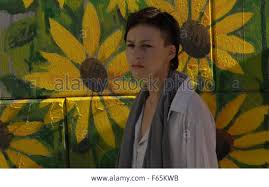
SELF-MADE
Israel, 2014, 89 minutes, Colour.
Sarah Adler, Samira Saraya.
Directed by Shira Geffen.
Self Made is a brief Israeli film focusing on two women. It is an art house, arty film, not for multiplex audience – which may limit its potential for some kind of mutual understanding between Israel and Palestine.
One of the women is a celebrity, an artists about to exhibit at the Venice Biennale, art work, installations, and talk about childbirth, not wanting children, and the removal of the uterus and its being stained to form a handbag. She has amnesia, orders a bed from a furniture company, their delivering it, trying to put together, thinking she has lost a screw, a man coming to cook crabs and playing the violin to soften them, some interviews, her visit to the installation and her reaction to a woman taking a selfie.
On the other hand, the Palestinian woman is mentally limited, works in the furniture factory, putting screws in bags, is sacked because of the Israeli woman’s complaint. A co-worker has a sexual encounter with her, but at home, she seems to be being groomed to be a suicide bomber and is being sent to Kuwait. She snatches a baby at security and is interned, changing places with the Israeli woman who goes to her house and is set up for the bombing while she goes to the Israeli house, is bewildered, hides in a truck and drives off to…
While quite well acted, and intriguing, for some the film may be too absurd, for others it may be illuminating, if not politically, at least for the mental and emotional states of women.
1. A perspective on Israel, on the occupied territories?
2. A perspective on women, a woman from each of the locations, similarities, differences, interchange?
3. A film with aspects of the absurd? Audiences accepting the characters, their behaviour, the difficulties, the exchange, living each other’s lives?
4. The Israeli story, the woman falling out of bed, her bruises, the reaction of her husband, his leaving, his IT job, going to Sweden, success, staying, the Skype discussions? His computer, the woman googling for the furniture company, and ordering the bed, not knowing its specifications, seeing the pornography, and the conversation with her husband appearing in the middle of the pornography? Her bewilderment, not remembering the trip, not able to work the coffee machine? Carrying the bed? The arrival of the new bed, trying to put it together, thinking the screw was missing, the phone call, her complaints, her demands, the reaction, the delivery of all the complimentary gifts including the playpen, the extra screw in the box? The photographer, her art work? The man coming to cook the crabs, her not remembering, the crabs in the bath, his playing the violin to soften them? The analogy of lifelessness within, life on the surface? The Germans coming to the interview, her being out of it, the questions, especially about speaking Arabic, about removing her uterus? Seeing the screw? Going to the exhibition, her work, avant-garde, installation, the interviews on the screens? The comments about her work, exhibition? The issue of children, the removal of the uterus, the visuals of it being coloured – and the comment that it be made a handbag? The lecture on her work, listening, the woman accosting her, wanting a selfie, taking the phone and flushing it? In the toilet, the guards breaking down the door? Her wandering against the wall with sunflowers? Her being taken by the Israeli guards, put in the compound with the Palestinian woman? The changing clothes? Her going to the house, the discussions about suicide bombing, her being dressed with the bombs? her wandering out?
5. The Palestinian story, the woman’s home, her mother, the friend, wanting a child, putting the balloon as if she was pregnant? Dropping the screws on the way to work? Her work, the packets of screws? The co-worker and his attention? Finding her way back with the screws? The complaint by the Israeli woman, her being sacked? The sexual encounter with the man, saying he said these things to all the women, his saying he meant his love for her? The plan for the suicide bombing, her being sent to Kuwait, at the airport, picking up the child, being chased, taken by the women and the security check? Put in the compound? The change of clothes, lack of a veil, the authorities thinking she was a celebrity, taking her to the house, her just following the leads, the people coming in for the furniture, her hiding in the truck, being taken in the truck, getting out and wandering?
6. The security guards, the young women, their attitude towards the Palestinians, suspecting bombs, iPads and earphones? The girl searching the Palestinian woman, talking on the phone, her birthday, coming to the concert with her boyfriend, asked to stay, her callous attitudes and the final talk?
7. The portrait of the women, the strange situations, the interchange – contributing to mutual understanding between Israel and Palestine (or not)?
Published in Movie Reviews
Published in
Movie Reviews
Tagged under
Saturday, 18 September 2021 20:00
Ex, The/ Fast Track
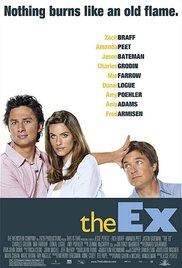
THE EX (FAST TRACK)
Us, 2007, 89 minutes, Colour.
Zach Braff, Amanda Peet, Jason Bateman, Charles Grodin, Mia Farrow, Donal Logue, Amy Poehler, Josh Charles, Paul Rudd.
Directed by Jesse Peretz.
A brief, sometimes breezy, sometimes blustery, romantic comedy – about marrieds. Zach Braff (Garden State, Scrubs, The Last Kiss) is a restaurant chef who stands up to his puffed up boss (Paul Rudd) and finds himself sacked just as he expected to be promoted. His wife (Amanda Peet) goes into labour and they have a beautiful son.
What is to be done? Go back to Ohio and work for his father-in-law in a sales company that has overdosed on New Age camaraderie and creativity? Dad is played by Charles Grodin and mum by Mia Farrow.
However, there is a demonic Iago at work who used to date Tom‘s wife, now finds all kinds of insidious, sneering but surface respectable ways of putting down, undermining him, while he plans to go to a top firm in Barcelona. All of which comes to a comeuppance head but not until after some hard slapstick as tries to defend himself (and gets himself further in a mess) because is a wheelchair bound paraplegic. He is played by Jason Bateman with quite some relish.
The film is in favour of marriage and love, shows the difficulties (and some amateur counsellor’s attempts to resolve conflicts), the hardships in trying to work while continually under pressure.
In many ways, it’s a throwaway film but one that is entertaining enough while on screen.
1. A likable contemporary comedy? Marriage, children, career, defending rights, the workplace, advertising, meanness and stupidity?
2. The title? Reference to Tom? The alternative title, Fast Track?
3. The city, the couple, names for their children, Tom’s work as a chef, the fight, his defence of his friend? Sophia going into labour, the issue of epidural, the doctor and his reluctant help, the baby called after him, Oliver? The crisis with Tom being sacked, Sophia not able to work, decisions?
4. Moving to Ohio, to the quiet neighbourhood, folksy? To their parents’ house, the chintzy furniture? The welcoming of Bob and Amelia? The parents and their characters, nice? Settling into the house, Bob as loving grandpa, merely as a loving grandma? The offering of the job?
5. Tom, manner, meeting the old school friend in the street, his living in the Hamptons, the yacht? Tom as a chef? The manager and his brutality, work demands? The source, Tom defending the Cook, his friend attacking the manager? Their being sacked?
6. Tom in Ohio, the company, advertising, New Age, genial, dress code, throwing the imaginary ball? The campaigns? Chip, in the wheelchair, Tom throwing the ball but his not being able to catch it? The meeting, online, direct mailing and the owner not wanting it, Tom and his making a mess of things? The way of apology, the Japanese comment, writing the note?
7. Sophia, at home, with the baby? Phone calls to New York and her friend being busy? The woman from school, with the baby, inviting Sophia to the meetings, the soothing gel for the nipples, laughing with the babies, making Sophia seem a bad mother? Sophia’s outburst against her?
8. Chip, in the wheelchair, his position in the company, his past attachment to Sophia, his undermining Tom, not catching the imaginary ball, Tom eating his yoghurts, watching him, the taunts, taking the photo and cutting Tom out? Carol and her warnings to Tom against Chip? Giving him a week?
9. Manny and Doug, cheerful, Manny and his hairpiece, training to be a marriage counsellor, the session with Sophia and Tom, getting them to hit each other, touching, his yelling at his mother, Tom hitting him? The laughing afterwards?
10. Wesley, the neighbour, his father and his being busy, Sophia allowing him to watch television, at the meals, swallowing the hamburger in one gulp? Tom filming it, offering to the campaign, everybody liking it? Tom meeting the Irishman in thinking he had a fake accent? The screening of the video – and Chip taking all the credit? Leaving Tom to explain the flowcharts and his foundering?
11. The video, Bob’s desk, the substitute, the fire, the destruction? Bob and his being unable to explain, his being sacked, blaming himself – and beginning to drink? Tom talking to him, the reconciliation, Chip being a substitute son, now his accepting Tom?
12. Sophia, upset, Chip and the meal, Tom finding the photo, the twin brother, Tom’s challenge, throwing Chip down the stairs? Sophia leaving?
13. Tom, confronting Chip, Chip getting out of the chair, the pretence, the sympathy, the fight, Chip fighting from the chair?
14. The phone call from Barcelona – and the fact that it was from Tom’s friend in New York? Chip and his defiance, getting out of the chair, offering to take Sophia, her answer to him? The scenes in Spain, after getting hit by the bus, two legs broken, his being evicted from the company?
15. Tom, the ups and downs, the backing of the New Age Don, buying the bike and Sophia upset, the bike accident, the Irish accent, interactions with Chip?
16. Tom setting up his own company, with Bob’s support, filming Wesley (and his star caravan status) happy family and future?
Published in Movie Reviews
Published in
Movie Reviews
Tagged under
Saturday, 18 September 2021 20:00
Still Water
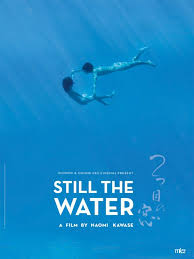
STILL THE WATER
Japan, 2015, 121 minutes, Colour.
Directed by Naomi Kawase.
Still the Water is a film by the celebrated Japanese director, Naomi, Kawase. Set in a provincial coastal town, it focuses on rituals, ceremonials, and a local woman as a shaman.
The film is also contemporary in its look at characters and their relationships, the film opening with a dead body washing ashore and discovered by an adolescent boy.
Complications arise concerning the boy and his family, the sexual behaviour and promiscuity of his mother, his father having moved to Tokyo – and the boy travelling to Tokyo to bond with his father, quite moving sequences. The boys is also emotionally involved, still at school, with a fellow student who is the daughter of the local shaman. Her father owns a restaurant which the young couple frequent.
While the mystery of the dead body is cleared, the film is more a study of the people concerned, especially the younger people and their interactions in the contemporary world, growing sexual awareness, especially in a final water scene, but also the adults and their coping with broken relationships and with death.
1. The work of the director? Her career, Japanese stories, Japanese sensibility, French collaboration?
2. The style, the narrative, characters, imagery, political aspects, contemplative aspects, silences?
3. The musical score, the local songs?
4. The title, the range of water seen? Turbulent and still? Death, life?
5. The introduction, the death of the goat, the ritual, the blood soaking, for the celebration? The goat hanging? the repeat of the sequence – with Kaito?
6. The dead body on the shore, the storm, the naked body, the tattoos, the wife looking at the body, Kaito finding it? The police and the cordon? The teacher at school, forbidding the children to go to the water, to swim? Kyoko in her clothes, swimming, her chatting with the old man?
7. The celebration, the people, the rituals, Japanese tradition? Feasts, the moon? Talk about the Shaman?
8. Kyoko at school, with Kaito, liking him, the swim, bike riding with him, the cafe and eating, her father’s cafe, her sick mother, the Shaman? Riding the bike, Kaito saying she was heavy, falling off? The doctor, the news of her mother’s health, the father and his grief, talk about the shaman and the gods, her mother, in bed, the view of the trees? Love and devotion, the visitors? The singing, the vigil, her final words, summoned by her mother? Grief?
9. Kaito, at home, his mother always out, his father in Tokyo, finding the body, seeing his mother and recognising the man, seeing his mother’s encounter in his dreams? At school, Kyoko, liking her, her advances and his refusal? The bike rides, saying she was heavy?
10. Going to see his father, his mother’s permission, the visuals of Tokyo, the father saying it had energy, the story of the marriage, the separation, issues of fate and love? The father leaving, his tattoo business, his clients and phone calls, his wanting to paint? Going out with his son, sharing the city, bonding with his son?
11. Kaito in his confusion, challenging his mother, refusing Kyoko’s advances, walking along the beach, the fear that his mother was dead, Kyoko at the beach, bringing him to the restaurant, with her father, his reassurance? Wet, talking, at the restaurant, seeing his mother, the reconciliation and is learning?
12. The sexual encounter with Kyoko, the naked swim in the still waters? Transition, adolescents, the different generations, parents, marriage and love, separation, death?
13. A future for the young couple?
Published in Movie Reviews
Published in
Movie Reviews
Tagged under
Saturday, 18 September 2021 20:00
Courted/ L'Hermine
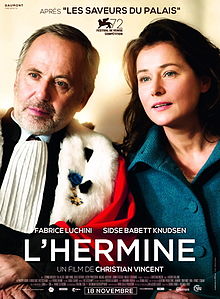
COURTED/ L’HERMINE
France, 2015, 98 minutes,.Colour.
Fabrice Luchini, Sidse Babette Knudsen.
Directed by Christian Vincent.
Courted is an interesting and entertaining French film about a judge and the justice system as well as his personal character and his infatuation with a witness.
Fabrice Luchini, veteran of French films for many decades from films by Eric Rohmer to In the House, plays a very strict judge, ritual in his entry in the court and his conduct of proceedings, considered by other lawyers as a kind of hanging judge. Into his court, comes a case where one of the witnesses is a woman, a nurse, who looked after him in hospital when he had an accident some years earlier and with whom he becomes infatuated.
During the trial, he has meals with the woman, advancing his own cause, she sympathetic but being very careful. Also in the action is the woman’s 17-year-old daughter who has a more relaxed attitude towards life and relationships.
The woman is played by Sidse Babette Knudsen, star of the popular Danish television series Borgen, was one of the two central characters in The Duke of Burgundy and appeared in the Dan Brown’s story, Inferno.
1. Legal and judicial film, a drama, personal stories? The blend?
2. French provincial town, the courts, the judge’s rooms, restaurants, hospitals? Authentic feel? Musical score?
3. The title? The English translation and its play on words?
4. The case, the death of the infant, the killing of the infant? Who? How? One covering for another? The unemployed father, the slow wife, the police, interrogation pressure, eliciting the confession? The inconsistencies? The denial? The court, the defendant and his single line that he was innocent? The wife not remembering detail? The range of evidence presented, the selection of the jury, their personalities, the possibility of asking questions? The judge’s comment about justice and the law being upheld, whether the defendant was found guilty or not?
5. Judge Racine, Fabrice Luchini and his screen presence? His age, experience, separation from his wife, his apartment, the story of his accident, being in hospital, being looked after by Ditte? In the court, his reputation, sentencing people severely, the gossip about him, his fall in the street and the interpretation, his having the flu, dependent on his secretary, going to the doctor, the consultation, injections, pills and warnings? His travelling case and his walk to and from the court?
6. The ritual, being referred to as the president, lining up, the robes, the bell, entering – a piece of theatre?
7. Justice, the case, the role of the judge, the defence lawyer, the prosecutor, the role of the jury, sitting up with the judge and his advisers, the process of selection, the different characters, their opinions, able to ask questions? The judge and his giving advice? The vote?
8. The range of proceedings, the role of the judge, his interventions, demands, having breaks?
9. The jury, their meetings, the different types, men and women, racial backgrounds, the discussions, presumptions, jokes, being serious?
10. The judge sending the note to Ditte, memories of the past, going to the restaurant, having drinks, the discussions, memories of the hospital, the judge and his dependence on Ditte, falling in love, the effect, the to and fro of their conversation? Her liking him? Tensions, appropriate behaviour or not? The return to the restaurant, Ditte’s daughter present, cavalier attitude, criticisms of the proceedings, being in the court, getting phone messages and texts and ignoring the judge and his explanations?
11. The scene of Ditte at home, her daughter, 17 years old, their banter, the discussions about the case, the daughter wanting to know about it, what people were wearing? Ditte and her reaction?
12. The defence lawyer, seemingly cavalier, his speech against the investigating officer?
13. The investigating officer, given a hard time and cross-examined by the judge?
14. What the audience was left with in terms of French Justice, judicial proceedings, the role of the judge, the defendant, witnesses, the administration of justice? And the personal story?
Published in Movie Reviews
Published in
Movie Reviews
Tagged under
Saturday, 18 September 2021 20:00
Tracers
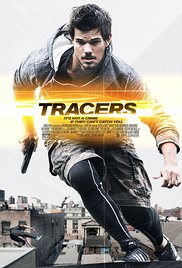
TRACERS
US, 2015, 94 Minutes, Colour.
Taylor Lautner, Marie Avgeropoulos Wallace, Adam Rayner, Rafi Gavron.
Directed by Daniel Benmayor.
Traces takes us initially into the activities of cycle deliveries in the streets of New York City – a subject of the Joseph Gordon-Levitt? Film, Premium Rush.
However, this film introduces the audience to the theme of Parkour. And it has some exhilarating sequences for younger audiences as well as older audiences, a group exhibiting the skills of moving through different buildings, roofs, scaling walls…
Taylor Lautner, famous for being the werewolf in the Twilight series, is an athlete who has had only moderate success in films, for example, Abduction. But, it is pointed out that he did all his stunt work for this film himself, quite amazing as it comes across on film.
He is in debt, becomes infatuated with the girl who destroyed his bike in an accident, meets the group who are skilled in Parkour and joins them for some criminal activity
Conventional material in itself but made more interesting because of the Parkour.
1. An action film for younger audiences? Parkour? The presence of Taylor Lautner and memories of Twilight? Action, robberies, romance…?
2. New York City, the emphasis on the streets and buildings, for bicycle deliveries, for Parkour activities? The action sequences, effects? The musical score?
3. The focus on Cam, his work, deliveries, speed and the touch of the reckless, the crash with Nicky, ruining his bike, wanting to give up, with his father’s car, the story of his father’s death, caring for his mother, taking up the loan, the bank foreclosing, the pressure on him to pay up, his inability to pay? His landlady, kind, his being broke, having to leave, the skateboarding? Her disappointment with him, wanting him to move?
4. The new bike, parking, its being stolen? Attraction to Nicky, her reserve?
5. Meeting the group, the different personalities, Dylan and his being indebted to Miller? His being accepted? Continued practice and improving skills?
6. His agreement to go in with the group, against the law, his skill in stealing the documents, escaping, disguise? The test, the shooting, his fleeing, his skill –
and their congratulating him for his skill and on passing the test?
7. His relationship with Nicky, her relationship with Miller, indebted to him after saving Dylan after the bashing, coming from Florida, her protecting her brother?
8. The Chinese, the loans, tough action – and Cam? The threats, taking his car?
9. The final set up, the Chinese, going against the rules and becoming involved in Chinatown? Cam agreeing to be in, the previous money and his paying his landlady, the gift of the skateboard, some of the money for the Chinese and paying his debt?
10. The detail of the crime, skills, the wrong information, the threats, the diamonds, the escape?
11. Miller, his background, an agent, corruption, his relationship with Nicky? Threats to Cam?
12. The diamonds, the Chinese Boss, her giving him a diamond, his possible future?
Published in Movie Reviews
Published in
Movie Reviews
Tagged under